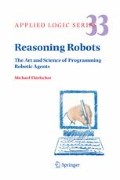Access this chapter
Tax calculation will be finalised at checkout
Purchases are for personal use only
Preview
Unable to display preview. Download preview PDF.
1.4 Bibliographical Notes
Wolfgang Bibel. A deductive solution for plan generation. New Generation Computing, 4:115–132, 1986.
Wolfgang Bibel. Let’s plan it deductively! Artificial Intelligence, 103(1–2):183–208, 1998.
Martin Davis. First order logic. In D. Gabbay, C. J. Hogger, and J. A. Robinson, editors, Handbook of Logic in Artificial Intelligence and Logic Programming, chapter 2, pages 31–65. Oxford University Press, 1993.
Richard E. Fikes and Nils J. Nilsson. STRIPS: A new approach to the application of theorem proving to problem solving. Artificial Intelligence, 2:189–208, 1971.
Gottlob Frege. Begriffsschrift. Louis Nebert, Halle, 1879.
Cordell Green. Theorem proving by resolution as a basis for question-answering systems. Machine Intelligence, 4:183–205, 1969.
[Große et al., 1996]_Gerd Große, Steffen Hölldobler, and Josef Schneeberger. Linear deductive planning. Journal of Logic and Computation, 6(2):233–262, 1996.
Steffen Hölldobler and Dietrich Kuske. Decidable and undecidable fragments of the fluent calculus. In M. Parigot and A. Voronkov, editors, Proceedings of the International Conference on Logic Programming and Automated Reasoning (LPAR), volume 1955 of LNAI, pages 436–450, Reunion Island, France, November 2000. Springer.
Steffen Hölldobler and Josef Schneeberger. A new deductive approach to planning. New Generation Computing, 8:225–244, 1990.
Christian Holzbaur and Thom Frühwirth, editors. Journal of Applied Artificial Intelligence: Special Issue on Constraint Handling Rules, volume 14(4). Taylor & Francis, April 2000.
[Masseron et al., 1993]_Marcel Masseron, Christophe Tollu, and Jacqueline Vauzielles. Generating plans in linear logic I. Actions as proofs. Journal of Theoretical Computer Science, 113:349–370, 1993.
John McCarthy and Patrick J. Hayes. Some philosophical problems from the standpoint of artificial intelligence. Machine Intelligence, 4:463–502, 1969.
John McCarthy. Programs with Common Sense. In Proceedings of the Symposium on the Mechanization of Thought Processes, volume 1, pages 77–84, London, November 1958. (Reprinted in: [McCarthy, 1990]).
John McCarthy. Situations and Actions and Causal Laws. Stanford Artificial Intelligence Project, Memo 2, Stanford University, CA, 1963.
Willard Quine. Methods of Logic. Harvard University Press, 1982.
Hans-Peter Störr and Michael Thielscher. A new equational foundation for the fluent calculus. In J. Lloyd etal, editor, Proceedings of the International Conference on Computational Logic (CL), volume 1861 of LNAI, pages 733–746, London (UK), July 2000. Springer.
Michael Thielscher. From situation calculus to fluent calculus: State update axioms as a solution to the inferential frame problem. Artificial Intelligence, 111(1–2):277–299, 1999.
Michael Thielscher. The qualification problem: A solution to the problem of anomalous models. Artificial Intelligence, 131(1–2):1–37, 2001.
Rights and permissions
Copyright information
© 2005 Springer
About this chapter
Cite this chapter
(2005). Special Fluent Calculus. In: Reasoning Robots. Applied Logic Series, vol 33. Springer, Dordrecht. https://doi.org/10.1007/1-4020-3069-X_1
Download citation
DOI: https://doi.org/10.1007/1-4020-3069-X_1
Publisher Name: Springer, Dordrecht
Print ISBN: 978-1-4020-3068-0
Online ISBN: 978-1-4020-3069-7
eBook Packages: Mathematics and StatisticsMathematics and Statistics (R0)

